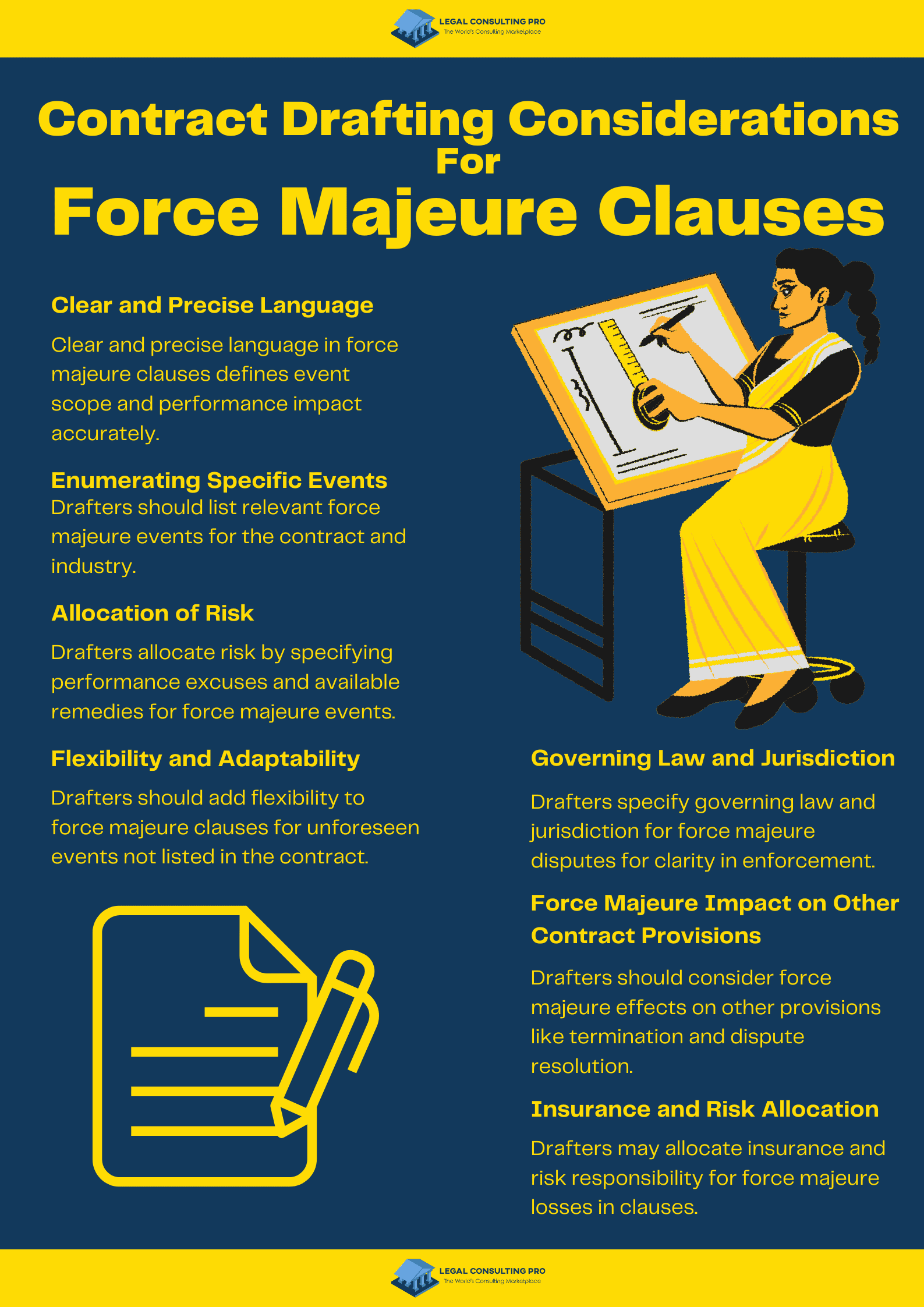The COVID-19 pandemic has reshaped the business landscape, highlighting the importance of robust legal protections to mitigate unforeseen risks and disruptions. Amidst unprecedented challenges, force majeure clauses have emerged as critical safeguards for businesses, offering protection against unforeseeable events beyond their control. This article explores the significance of force majeure clauses in a post-pandemic world, delving into their implications for contract drafting, contract management, and business continuity planning.
Understanding Force Majeure Clauses
Force majeure clauses, also known as “Act of God” clauses, are contract drafting provisions that excuse parties from performing their contract management obligations in the event of unforeseeable circumstances that render performance impossible or impracticable. These circumstances typically include natural disasters, wars, strikes, government actions, and pandemics.
Elements of Force Majeure Clauses
- Identification of Trigger Events: Force majeure clauses enumerate specific events or circumstances that constitute force majeure events, such as acts of nature, government regulations, or labor disputes.
- Definition of Impact: Force majeure clauses define the impact of the triggering event on the parties’ ability to perform their contract drafting obligations, such as impossibility, impracticability, or delay.
- Notice Requirements: Force majeure clauses often include notice requirements that obligate parties to notify each other promptly upon the occurrence of a force majeure event and provide details of its impact on performance.
- Consequences of Invocation: Force majeure clauses specify the consequences of invoking the clause, such as suspension of obligations, extension of deadlines, or termination of the contract.
Contract Drafting Considerations For Force Majeure Clauses
- Clear and Precise Language: Effective contract drafting requires clear and precise language in force majeure clauses to accurately define the scope of force majeure events and their impact on performance.
- Enumerating Specific Events: Contract drafters should enumerate specific force majeure events relevant to the nature of the contract and the industry in which the parties operate.
- Allocation of Risk: Contract drafters must carefully allocate risk between the parties by specifying the extent to which force majeure events excuse performance and the remedies available to the non-performing party.
- Flexibility and Adaptability: Contract drafters should incorporate flexibility and adaptability into force majeure clauses to accommodate unforeseen events that may not be explicitly listed in the contract. Including catch-all provisions that encompass any event beyond the parties’ reasonable control ensures that the clause remains relevant and effective in addressing emerging risks.
- Governing Law and Jurisdiction: Contract drafters must specify the governing law and jurisdiction applicable to force majeure disputes to provide clarity and certainty regarding the interpretation and enforcement of the clause. Choosing the appropriate governing law and jurisdiction helps to avoid legal uncertainties and conflicts that may arise in cross-border contract drafting or international transactions.
- Force Majeure Impact on Other Contract Provisions: Contract drafters should consider the ripple effects of force majeure events on other contract provisions, such as termination clauses, indemnification obligations, and dispute resolution mechanisms. Clarifying how force majeure affects these provisions ensures consistency and coherence in contract interpretation and enforcement.
- Insurance and Risk Allocation: Contract drafters may include provisions addressing insurance coverage and risk allocation in force majeure clauses to allocate financial responsibility for losses resulting from force majeure events. Specifying whether insurance proceeds to offset the non-performing party’s liability or whether insurance coverage is a prerequisite for invoking the force majeure clause enhances clarity and transparency in risk allocation.
- Relationship with Other Legal Concepts: Contract drafters should consider the relationship between force majeure clauses and other legal concepts, such as frustration of purpose, impossibility, and impracticability, under applicable law. Harmonizing force majeure provisions with these legal doctrines ensures consistency and coherence in addressing unforeseen events that affect contract drafting performance.
- Review and Revision Protocols: Contract drafters may establish review and revision protocols for force majeure clauses to ensure that they remain relevant and effective over time. Regular reviews of force majeure clauses allow parties to assess changing risks, update trigger events, and incorporate lessons learned from previous force majeure events, enhancing the clause’s utility and enforceability.
By incorporating these additional considerations into contract drafting practices, businesses can enhance the effectiveness and resilience of force majeure clauses, providing essential protection against unforeseen risks and disruptions in a post-pandemic world.

Implications for Contract Management
Contract Review and Analysis:
- Contract managers play a crucial role in reviewing existing contract drafting to assess the adequacy of force majeure clauses and their applicability to current circumstances.
- Contract managers analyze force majeure clauses to determine whether the pandemic qualifies as a force majeure event and assess the impact on contract management obligations and performance timelines.
Negotiation and Revision:
- Contract managers engage in negotiation with counterparties to revise existing contract drafting or incorporate force majeure provisions into new contracts to address the implications of the pandemic and other unforeseen events.
- Negotiation may involve discussions on the allocation of risk, the extent of force majeure relief, notice requirements, and dispute resolution mechanisms.
Compliance and Documentation:
- Contract drafting and managers ensure compliance with notice requirements and other procedural obligations outlined in force majeure clauses to preserve contract management rights and remedies.
- Contract drafting and managers maintain accurate documentation of force majeure events, including the timing of occurrence, notification to counterparties, and efforts to mitigate the impact on performance.
Business Continuity Planning
Risk Assessment and Mitigation:
- Force majeure clauses serve as key components of business continuity planning, enabling businesses to assess and mitigate risks associated with unforeseen events.
- Businesses identify potential force majeure events and implement risk mitigation strategies, such as diversification of suppliers, insurance coverage, and contingency planning.
Scenario Planning:
- Businesses conduct scenario planning exercises to anticipate and prepare for various force majeure scenarios, including pandemics, natural disasters, supply chain disruptions, and regulatory changes.
- Scenario planning enables businesses to develop contingency plans, allocate resources effectively, and minimize the impact of force majeure events on operations and finances.
Conclusion
In a post-pandemic world fraught with uncertainty, force majeure clauses have become indispensable tools for businesses seeking to navigate unforeseen risks and disruptions. By incorporating robust force majeure provisions into contract drafting, businesses can mitigate the impact of unforeseeable events on contract management obligations and safeguard their interests. Contract drafting and contract management professionals play pivotal roles in ensuring the effectiveness and enforceability of force majeure clauses, thereby enhancing business resilience and continuity in an increasingly volatile environment. As businesses adapt to evolving challenges and opportunities, the importance of force majeure clauses as essential protections for every business remains undisputed.
Similar blogs:
eSports Contract Drafting: Leveling the Playing Field for Players and Sponsors
6 Best Practices for Industry-Specific Contract Drafting: Insights from Expert Lawyers







































